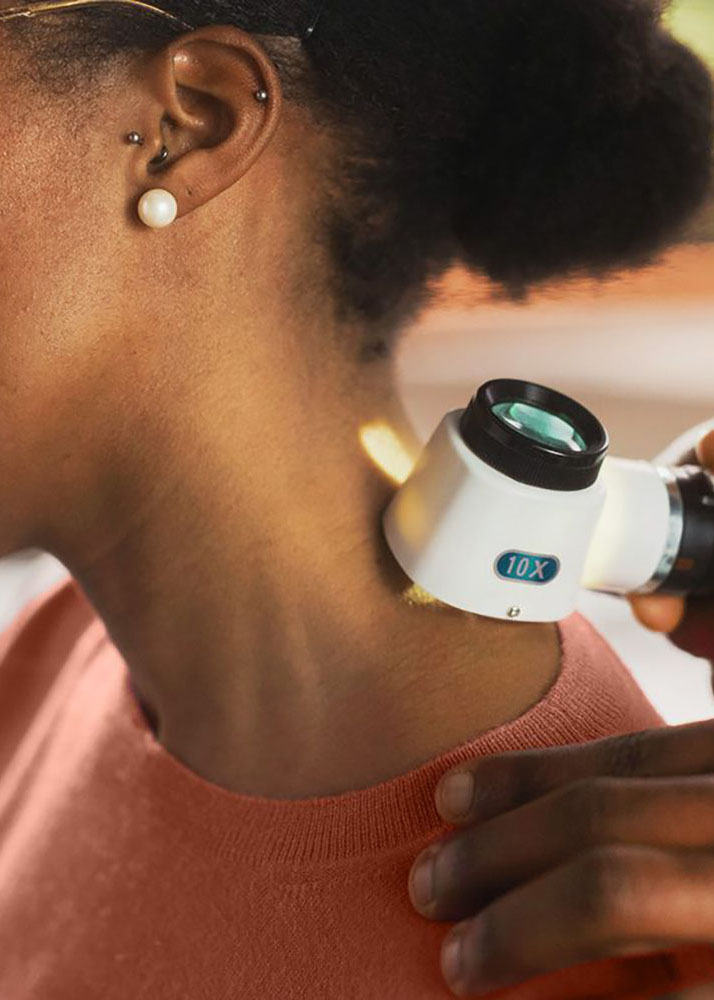Skin Cancer Testing
We offer comprehensive skin cancer testing to detect and treat skin cancer at the earliest stages. Skin cancer is the most common type of cancer, but with early detection and appropriate treatment, it can be effectively managed. Regular skin checks and screenings are crucial for identifying suspicious lesions or growths that may require further evaluation.

Types of Skin Cancer We Test For
1. Basal Cell Carcinoma (BCC)
- The most common type of skin cancer
- Typically appears as small, shiny, or waxy bumps on the skin, usually in areas exposed to the sun
2. Squamous Cell Carcinoma (SCC)
- Appears as red, scaly, or crusted growths
- Often found on areas like the face, ears, neck, chest, or back
3. Melanoma
- The most dangerous form of skin cancer, often appearing as irregular, multi-colored moles or spots
- Can develop anywhere on the skin, but is more common in areas exposed to the sun
4. Merkel Cell Carcinoma
- A rare and aggressive form of skin cancer, typically presenting as a firm, painless nodule on the skin
5. Kaposi Sarcoma
- Often associated with HIV/AIDS, it appears as red, purple, or brown patches or nodules on the skin
Signs to Watch For
- New or changing moles or growths on the skin
- Uneven edges, color variation, or bleeding in existing moles
- Itching, pain, or tenderness around a lesion
- Crusting or bleeding from a mole or spot that doesn’t heal
Skin Cancer Testing Process
1. Visual Skin Examination
- Our dermatologists conduct a thorough visual examination of your skin to check for any suspicious lesions, moles, or growths.
- High-risk areas, such as the face, ears, scalp, and back, are closely inspected for signs of skin cancer.
2. Dermoscopy
- A non-invasive tool that magnifies and illuminates the skin, allowing us to see deeper layers and identify suspicious changes.
3. Biopsy
- If any suspicious lesion is found, we may recommend a biopsy to remove a small tissue sample for laboratory analysis to confirm whether it is cancerous.
- Types of biopsies include shave biopsy, punch biopsy, and excisional biopsy.
4. Mole Mapping
- For individuals at high risk of skin cancer, we offer mole mapping, a technique that involves taking detailed photographs of your skin to track any changes over time.
Treatment Options for Skin Cancer
- Surgical Removal – Excision of the tumor to remove it completely
- Cryotherapy – Freezing of abnormal tissue to destroy cancerous cells
- Topical Treatments – Medications to treat superficial skin cancers
- Radiation Therapy – For cancers that are difficult to remove surgically
- Chemotherapy – In advanced cases, to treat widespread cancer
Why Choose Derma Skin Clinic for Skin Cancer Testing?
- Experienced Dermatologists with expertise in skin cancer detection and treatment
- Advanced Diagnostic Tools like dermoscopy and biopsy for accurate results
- Comprehensive Care for early detection, treatment, and prevention of skin cancer
- Personalized Follow-Up to monitor your skin health and detect any changes over time
Book Your Skin Cancer Screening Today
If you notice any changes in your skin or have concerns about skin cancer, visit Derma Skin Clinic for a professional skin cancer screening. Early detection is the key to effective treatment.
Contact us today to schedule your consultation and take the first step in safeguarding your skin health.

